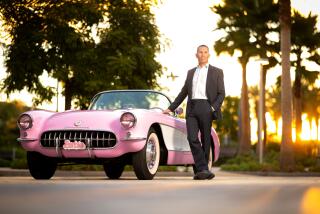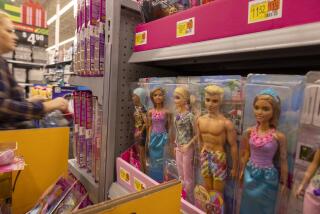Mattel scraps Aristotle, a kid-focused AI device that sparked health and privacy worries
- Share via
Mattel Inc. decided not to move forward with plans to sell a kid-focused smart hub after new executives decided it did not “fully align with Mattel’s new technology strategy,” according to a company statement.
Children’s health and privacy advocates this week petitioned the toy giant not to release the device, which they argued would give the El Segundo company an unprecedented look into the personal lives of children.
In a statement Wednesday, Mattel said that it had decided internally not to take the product to market after a new chief technology officer, Sven Gerjets, joined the company in July. Gerjets, Mattel said, reviewed the product and decided “not to bring Aristotle to the marketplace as part of an ongoing effort to deliver the best possible connected product experience to the consumer.”
Aristotle was designed for a child’s room. It could switch on a night light to soothe a crying baby. It also was designed to keep changing its activities, even to the point where it could help a preteen with homework. And the device would learn about the child along the way.
Objections to Aristotle were twofold. For one, the existence of a home hub for kids raised questions about data privacy for a vulnerable population. It also triggered broader concerns about how quickly companies are marketing products to parents without understanding how technology could affect early childhood development.
The product drew attention from Sen. Edward Markey (D-Mass.) and Rep. Joe Barton (R-Texas), who sent Mattel a letter last week asking the toymaker for more information on how it will store and retain data it collects on children. Mattel has said it would protect the Aristotle data with high-level encryption and would not sell that information to advertisers — in compliance with children’s data privacy laws.
But privacy concerns weren’t the only issue.
“My main concerns about this technology — apart from the privacy concerns that [Markey and Barton] are trying to address — is the idea that a piece of technology becomes the most responsive household member to a crying child, a child who wants to learn, or a child’s play ideas,” said pediatrician Jennifer Radesky, who wrote the American Assn. of Pediatrics’ 2016 media guidelines for children zero to 6 years of age. (Radesky was not involved with the campaign to persuade Mattel to stop Aristotle sales.)
Aristotle may be gone, but it would have been one of many products firms are offering to make the parenting world more high-tech. Kid-focused tablets and apps have been around for years, and parents have made their own decisions about the proper place for technology in their children’s lives. But devices are increasingly moving into areas that are far more personal — or more intrusive. There are smart cradles that can rock your baby for you. There’s a smart cushion to calm colicky infants by cradling them while playing a recording that mimics a parent’s heartbeat.
Little is known about the effects of tech devices on early childhood development, and experts say it will take time to figure that out. But child privacy and child development experts are becoming increasingly uncomfortable with where the tech is heading.
Last year, Mattel faced pushback from those worried about the surveillance possibilities of “Hello Barbie,” a talking version of the classic doll that learns about its human playmates by recording their voices over time via Wi-Fi. Through play sessions, the doll learns facts such as the name of the family dog. It then incorporates this information into conversation. The thought that a doll would be slowly collecting information on a child alarmed many privacy advocates who labeled the toy “creepy.” The product didn’t sell well at launch after poor reviews, many of which mentioned the privacy concerns.
Several privacy advocates and physicians, organized by nonprofit groups the Campaign for a Commercial-Free Childhood and the Story of Stuff Project, signed a petition asking Mattel not to release Aristotle, which was set to hit stores next year. “Young children should not be guinea pigs for AI experiments. Please put the well-being of children first and end the production of Aristotle,” the petition said. It had 15,000 signatures.
“We commend Mattel for putting children’s wellbeing first and listening to the concerns of child development experts and thousands of parents who urged them not to release this device,” said Josh Golin, executive director for the Campaign for a Commercial-Free Childhood. “This is a tremendous victory for everyone who believes children still have a right to privacy and that robots can never replace loving humans as caregivers.”
Tsukayama writes for the Washington Post.
More to Read
Inside the business of entertainment
The Wide Shot brings you news, analysis and insights on everything from streaming wars to production — and what it all means for the future.
You may occasionally receive promotional content from the Los Angeles Times.










